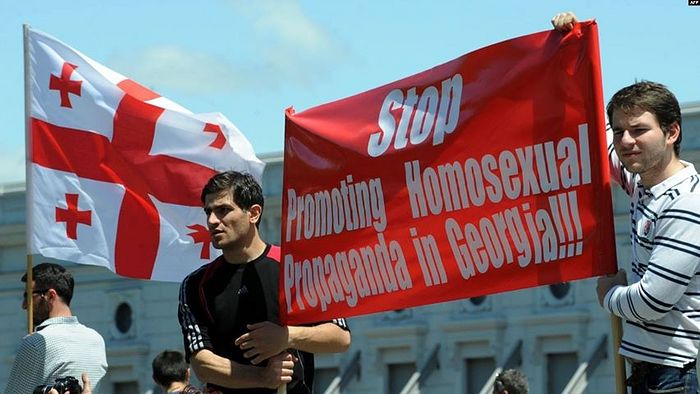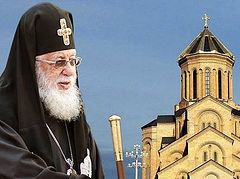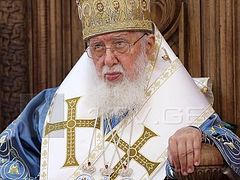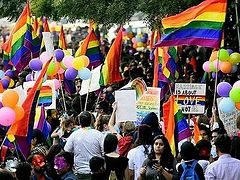Tbilisi, June 17, 2019
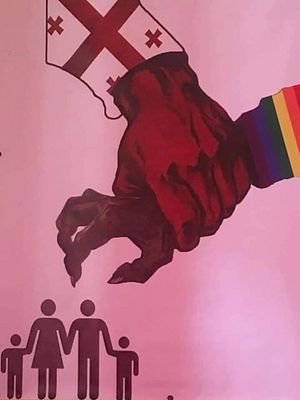 Two events were held simultaneously on Friday evening in front of the government administration building in Tbilisi, one led by LGBT activists and the other by defenders of the traditional family and traditional values, on the eve of the first Tbilisi Pride event scheduled for June 18-23.
Two events were held simultaneously on Friday evening in front of the government administration building in Tbilisi, one led by LGBT activists and the other by defenders of the traditional family and traditional values, on the eve of the first Tbilisi Pride event scheduled for June 18-23.
The two sides were divided by a cordon of police, reports Interfax-Religion.
Georgia is a deeply traditional country, with more than 80% of the population belonging to the Orthodox Church, and the battle between traditional, Orthodox values and more liberal, secularized values is being prompted and aggravated not only by the nation’s LGBT community, but by the great Western powers, Archpriest David Isakadze, and others, believes.
“It is clearly evident who is controlling the processes in Georgia,” Fr. David said. “We truly want to be an independent country, not in word, but in deed. The U.S. authorities, in the person of the ambassador [Elizabeth Rood—O.C.] directly interfere in our internal affairs. She wants to control the processes here and exacerbate the situation, knocking people against one another,” Fr. David explained, noting that he and those of like mind are prepared to demand that the U.S. withdraw its acting ambassador if she does not immediately appeal to the participants in the LGBT event to disband.
The Georgian Patriarchate issued a statement on Friday, calling on the authorities to prevent the event, citing the divisions it causes in the traditional society that largely stands against the sinful nature of the LGBT lifestyle. At the same time, the Church declared that there must be no violence surrounding the events.
The interference is not limited to the U.S., of course. The Messenger Online recently interviewed Johannes Kahrs, the head of the Germany-South Caucasus Friendship Group of the German Parliament, who spoke about his nation’s active work in Georgia promoting Tbilisi Pride.
Asked what has changed in Georgia over the years, Kahrs responds: “I think people are getting more and more open, it’s something we didn't see before. This time we lobbied a lot with the head of your parliament and our colleagues, as well as with everyone we've met to give the upcoming Pride a chance in June.”
He further notes that he attended the first Pride events in Romania and Bulgaria and that a colleague attended the first event in Kiev. The first event “is always awful,” he says, but after 4 or 5 years “it gets normalized.”
“[Pride] is always good for the spirit of the city, because it’s a sign that the city is getting more liberal and accepting. It will certainly change the city. Some people might hate this change, but, in the long run, Tbilisi will profit from it. When it gets more liberal, more colorful, more open it is usually a good thing,” Kahrs claims.
The British House of Commons recently discussed its concern about security surrounding the Tbilisi Pride event.
From September to October last year, the UN Independent Expert on the protection against violence and discrimination based on sexual orientation and gender identity, Victor Madrigal-Borloz, visited Georgia “to assess the implementation of existing national and international human rights standards to combat violence and discrimination against lesbian, gay, bisexual, and transgender (LGBT) people in the country.”
“During my visit I will identify progress towards the elimination of violence and discrimination based on sexual orientation and gender identity, highlight remaining gaps and challenges, and provide recommendations to relevant stakeholders,” Madrigal-Borloz said.
“I will also explore factors impacting on the vulnerability and the risk of exclusion and marginalisation of LGBT persons, and explore the root causes of violence and discrimination, including the impact of social prejudice, and the link between hate speech and hate crime.
According to Georgian media, 9 people were detained by police for disobeying the requirements of law enforcement agencies, in particular trying to break through the cordon and stop the LGBT activists from holding their event.
Follow us on Facebook!

